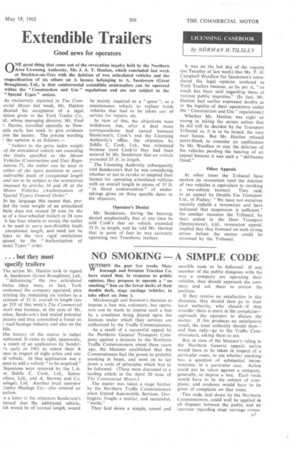Extendible Trailers
Page 57

If you've noticed an error in this article please click here to report it so we can fix it.
Good news for operators
ONE good thing that came out of the revocation inquiry held by the Northern Area Licensing Authority, Mr. J. A. T. Hanlon, which concluded last week
at Stockton-on-Tees with the deletion of two articulated vehicles and the respecification of six others on A licence belonging to A. Sanderson (Great Broughton), Ltd., is that controversial extendible semi-trailers can be operated within the "Construction and Use" regulations and are not subject to the "Special Types" orders.
As exclusively reported in The Cornercial Motor last week, Mr. Hanlon dicated his acceptance of a legal 3inion given to the York Trailer Co., td., whose managing director, Mr. Fred 7. Davies, travelled specially to Newtstle early last week to give evidence ?on the matter. The precise wording the opinion is as follows:— " Subject to the gross laden weight of the articulated vehicle not exceeding the limits specified in the Motor Vehicles (Construction and Use) Regulations 71, the trailer can be used in either of the open positions to carry indivisible loads of exceptional length and not to be subject to the restrictions imposed by articles 14 and 16 of the Motor Vehicles (Authorization of Special Types) General Order."
In lay language this means that, proJed the total weight of an articulated hide does not exceed 20 tons (in the se of a four-wheeled trailer) or 24 tons it has four wheels or more), the trailer n be used to carry non-divisible loads exceptional length, and need not be bject to the very rigid restrictions tposed by the "Authorization of iecial Types" order. be mainly required as a "spare "; as a maintenance vehicle to replace trunk vehicles that had to be taken out of service for repairs, etc.
In view of this, the objections were withdrawn but, after a deal more correspondence had passed between Sanderson's, Cook's and the Licensing Authority's office, the objection by Siddle C. Cook, Ltd., was reinstated because (said Cook's) they had been assured by Mr. Sanderson that no vehicle exceeded 35 ft, in length.
The Licensing Authority subsequently told Sanderson's that he was considering whether or not to revoke or suspend their licence for operating articulated vehicles with an overall length in excess of 35 ft. "in direct contravention" of undertakings given on three specific dates to the objectors, Operator's Denial
Mr. Sanderson, during, the hearing, denied emphatically that at any time he told Cook's that no vehicle exceeded 35 ft. in length, and he told Mr. Hanlon that in point of fact he was currently operating two Trombone trailers.
It was on the last day of the inquiry (on Tuesday of last week) that Mr. T. H. Campbell Wardlaw for Sanderson's introduced the legal opinion tendered to York Trailers because, as he put it, "so much has been said regarding them at various public inquiries." (In fact, Mr. Hanlon had earlier expressed doubts as to the legality of their operations under the "Construction and Use" regulations.) Whether Mr. Hanlon was right or wrong in taking the severe action that he did will be decided by the Transport Tribunal in, it is to be hoped, the very near future, But Mr. Hanlon refused point-blank to consider an application by Mr. Wardlaw to stay the deletion of the vehicles pending the hearing of an appeal because it was such a "deliberate fraud."
Other Appeals At other times the Tribunal have spoken on revocation (and the deletion of two vehicles is equivalent to revoking a two-vehicle licence). They said, in an appeal by Double Ess Transport, Ltd., of Pudsey: "We have not ourselves recently upheld a revocation and have indicated that suspension is sufficient." On another occasion the Tribunal, by their action in the Dent Transport (Spennymoor), Ltd., revocation appeal, implied that they frowned on such strong action before the matter could be reviewed by the Tribunal.




















































































































